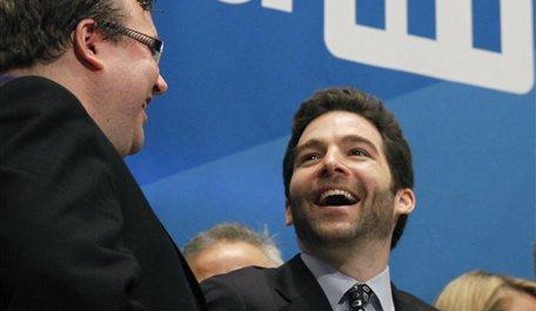A new government regulation could end up causing serious damage to freedom of speech and freedom of the press. The Labor Department is finalizing a new fiduciary rule which the government claims will save the middle class billions of dollars by requiring the the firm and adviser to provide advice “in the client’s best interest.” Via the Labor Department’s website:
*Commits the firm and adviser to providing advice in the client’s best interest. Committing to a best interest standard requires the adviser and the company to act with the care, skill, prudence, and diligence that a prudent person would exercise based on the current circumstances. In addition, both the firm and the adviser must avoid misleading statements about fees and conflicts of interest. These are well-established standards in the law, simplifying compliance.
*Warrants that the firm has adopted policies and procedures designed to mitigate conflicts of interest. Specifically, the firm must warrant that it has identified material conflicts of interest and compensation structures that would encourage individual advisers to make recommendations that are not in clients’ best interests and has adopted measures to mitigate any harmful impact on savers from those conflicts of interest. Under the exemption, advisers will be able to continue receiving common types of compensation.
*Clearly and prominently discloses any conflicts of interest, like hidden fees often buried in the fine print or backdoor payments, that might prevent the adviser from providing advice in the client’s best interest. The contract must also direct the customer to a webpage disclosing the compensation arrangements entered into by the adviser and firm and make customers aware of their right to complete information on the fees charged.
The White House’s line is that this going to enact even more reforms on Wall Street, “to make sure taxpayers aren’t going to bail out financial institutions that make risky bets.” That line from Josh Earnest is highly amusing (and hypocritical) since President Barack Obama argued in favor of the bank bailout in 2008. But the rules also show the White House doesn’t care at all about the accidental effects of the new rules which have the chance to censor several well-known financial commentators from being on the air. Via John Berlau at Forbes:
Experts both for and against the rule I have talked to agree its broad reach could extend to financial media personalities who offer tips to individual audience members, a group that includes not just [Dave] Ramsey but TV hosts like Suze Orman and Jim Cramer, as well as many other broadcasters who opine on business and investment matters. They would be ensnared by the rule’s broad redefinition of a vast swath of financial professionals as “fiduciaries” and its mandate that these “fiduciaries” only serve the “best interest” of IRA and 401(k) holders.
This is censorship whether it’s accidental or on purpose. It’s silencing people who offer advice, regardless of whether people decide to accept said advice or not. What this shows is how the government doesn’t trust “the people they serve,” so it gives them an excuse to put their greedy little fingers into every pie. This is something which effects every stage of government from local to state to federal. Government has gone from being the nightwatchman to being the overprotective parents who lord over their kids with an iron fist. The unfortunate part is it’s not just Democrats who love bureaucratic regulations, but Republicans as well. Veronique de Rugy wrote in Reason in January 2009 how the Bush Administration deserves blame too because it decided to carve out a variety of regulations which cost the economy billions of dollars, including the Department of Homeland Security, Sarbanes-Oxley, and McCain-Feingold. Regulated burdens jumped 62% during the Bush Administration, after “only” (note sarcasm) going up 31% during the Clinton Administration.
It’s easy to sit here and play the “blame game” on how we’ve gotten here, but that doesn’t answer the question of what happens next. How do we stop the regulation lifestyle from continuing until it sucks every bit of life from the economy? The obvious answer is to say, “elect politicians who won’t give into the DC lifestyle,” but what happens when those politicians stray away from their promises? Do they get tossed out immediately or is it more important to keep hounding said politician until they remember what they were sent to DC for? The latter is probably better because of how isolated DC is from the rest of the nation. It means conservative and libertarian voters have to be willing to call into their representative’s office and remind them who they serve. It also means people need to be willing to say to a politician, “Hey! When will you come visit us and hear from us?” as a way to remind the politician who got them in to office. But it also requires voters to tell their friends and neighbors what’s going on too. Incumbent name value is a big thing, so it’s up to people to get the word out when a legitimate primary challenger rises up. It’s not an easy thing to do because primary challengers need to be vetted to make sure they’ll do what they say they’ll do, but it’s worth it if it keeps the regulation lifestyle from continuing.
There’s one other thing those who aren’t fans of regulation need to do: convince others of why less regulation is good. I remember a college professor once telling a class they couldn’t avoid bureaucracy. Well, why not? Why can’t more and more people believe they don’t need the government to watch what they doing, and can be their own master? Is it because there are plenty of people out there who believe mankind is a stupid, gullible lot who may or may not be able to tell the difference between truth and a lie (to steal a line from Terry Goodkind’s Wizard’s First Rule)? Or is it because freedom and liberty activists aren’t willing to take the time (and the risk) to challenge the beliefs of others and convince them their way is better, and keep going when it appears people aren’t listening.








Join the conversation as a VIP Member